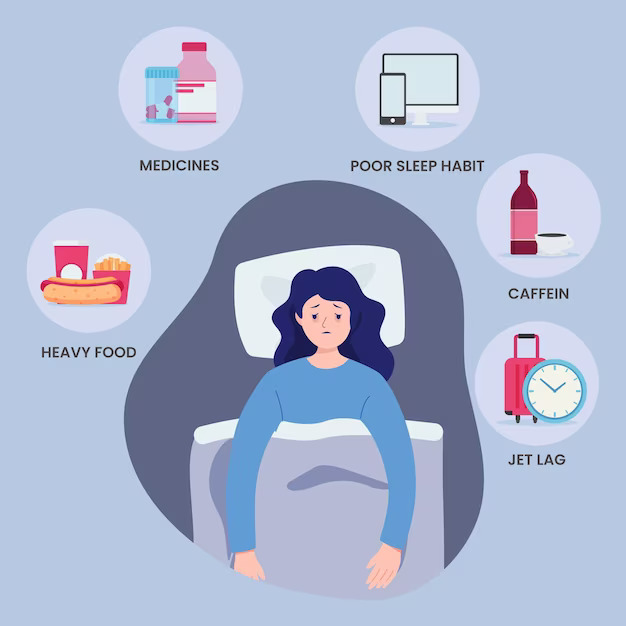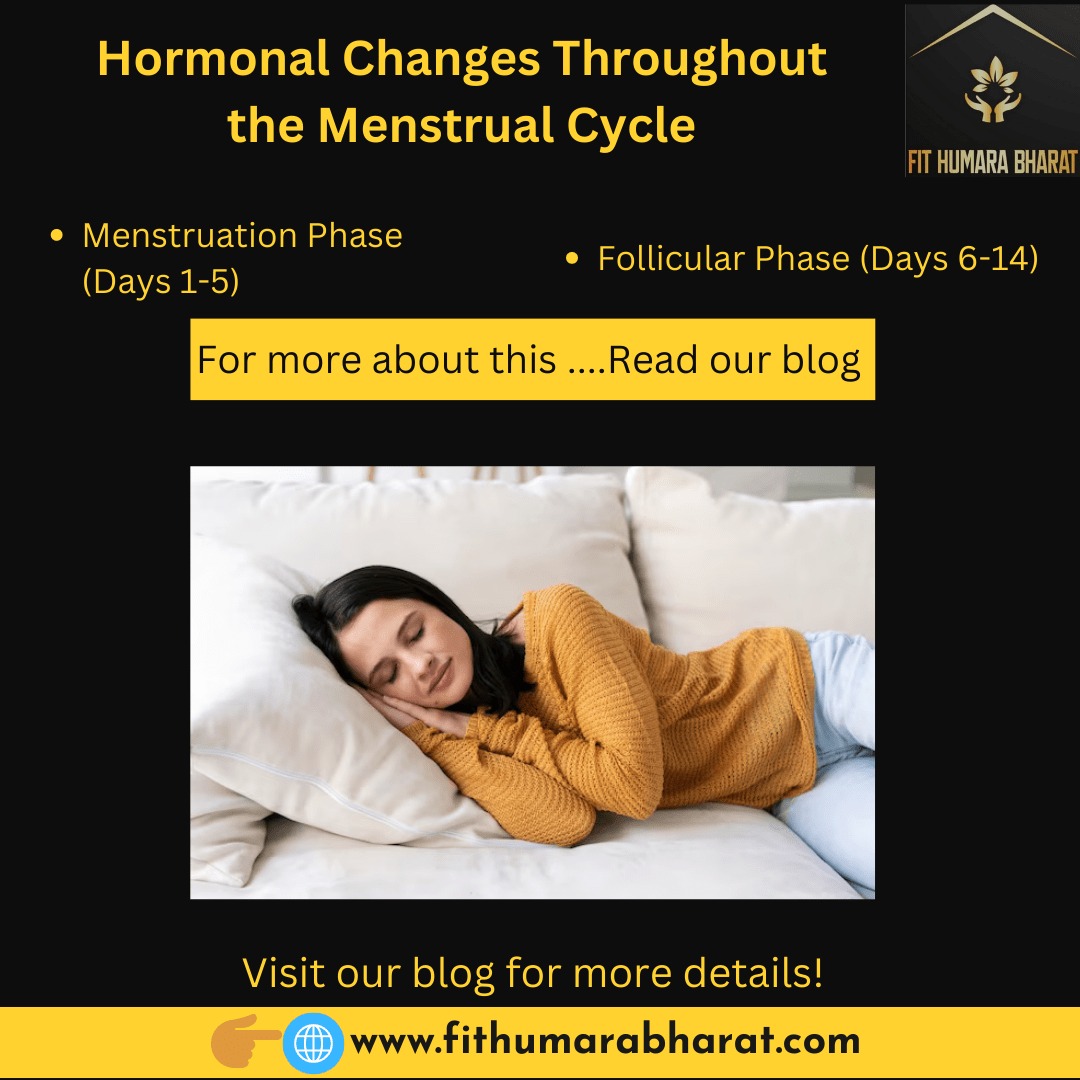If you have experienced trouble sleeping and remaining asleep, there is nothing to worry about because it’s a common problem. In women, sleep troubles are common issues and can be affected by different factors. The critical factor that frequently doesn’t get noticed is hormones’ influence on sleep quality.
In this blog, let’s discover how women’s hormones can influence their sleep and give practical tips to improve sleep patterns.

Stats & Studies on Sleep Pattern
Studies & Research has shown that women report 28% more sleep difficulties and are at greater risk for a diagnosis of insomnia compared to men.
30% of pregnant women and 42% of postpartum women reported sleep issues, compared with 15% among all women, as per National Sleep Foundation’s 2007 poll.
25% of perimenopausal women and 30% of postmenopausal women reported getting a good night’s sleep only a few nights per month or less.
The prevalence of sleep disorders is variable, ranging from 16% to 42% in premenopausal women, from 39% to 47% in perimenopausal women, and from 35% to 60% in postmenopausal women.
Hormonal Changes Throughout the Menstrual Cycle
For adult women, the periods or menstrual cycle are constant and natural hormonal fluctuations. The periods usually involve hormones playing crucial roles at various stages. The important hormones in this procedure are progesterone and Estrogen, which prepare your body for a prospective pregnancy.
1. Menstruation Phase (Days 1-5)
Initial days of periods release hormones like progesterone and Estrogen, which can cause emotions of tiredness and fatigue.
2. Follicular Phase (Days 6-14)
Estrogen levels rise slowly when the body gets ready for ovulation. This estrogen boost can increase energy levels and improve mood, potentially causing improved quality.
3. Ovulation Phase (Day 14)
Estrogen levels increase during ovulation. Some females may face trouble falling asleep throughout this time because of increased body temperature and hormonal fluctuations.
4. Luteal Phase (Days 15-28)
Post ovulation, progesterone levels grow while estrogen levels begin to fall. Progesterone has a soothing effect and can support improved sleep. But some females may still experience disturbed sleep throughout this stage.
Pregnancy and Sleep
Pregnancy is a phase of considerable hormonal transitions, which can substantially impact a woman’s sleep patterns. The boost in hormones, like hCG or human chorionic gonadotropin, progesterone, and Estrogen, can often cause trips to the bathroom, general discomfort, and morning sickness, all of which can disturb sleep.
A growing womb can also make it hard to find a relaxed sleeping position throughout the later phases of pregnancy. Consequently, several pregnant women experience troubled sleep and may struggle to get the recommended rest.
Menopause and Sleep Disturbances
Menopause is also a natural stage in a female’s life that happens when she stops menstruating. This change is related to substantial hormonal changes, especially a fall in progesterone and estrogen production.
“70% Women may have night sweats and hot flashes as estrogen levels decline, which can upset sleep and cause nighttime awakenings. Furthermore, the drop in progesterone levels can add to emotions of restlessness and anxiety.”
Tips for Improving Sleep
Now that you realize when to anticipate the hormone-induced phase of staying awake and having difficulty sleeping, you can build sleep troubles that will aid you in navigating those periods.
Remember that you cannot entirely blame hormones for bad sleeping quality. Various lifestyle factors also contribute to undisturbed sleep. Hopefully, there are some things you can control, and there are some tips to improve your sleep habits –
Follow a frequent sleep routine always or every day
Your body needs consistency. Thus, you should go to bed at the same time every night and stay asleep for an additional hour because that will aid in improving your sleep quality.
Don’t eat right before sleeping.
That can be hard because hunger hormones usually grow at night, whereas those that make you feel full tend to decline through the evening. But eating food late before sleep can hinder your sleep; otherwise, you will develop obesity and diabetes.
Reduce your screen time at night.
Melatonin is a sleep-inducing hormone that controls your sleep-wake cycle. Throughout the day, sunlight stops your body from creating melatonin and aids in keeping you wakeful. Lights from laptops and mobile phones can also suppress melatonin; hence reducing these screen times at bedtime will help you fall asleep.
Avoid drinking caffeine after noon.
Adenosine is another primary sleep-inducing hormone that automatically boosts at night. Caffeine blocks adenosine receptors and can influence your sleep even when you drink many hours before sleeping. You can prefer decaf!
Avoid drinking alcohol within three hours at night.
Alcohol may also make you feel sleepy initially. However, you will be awake, and it will be hard to return to sleep.
Produce a sleep atmosphere that is dim, quiet, and at the right temperature.
You can use a white noise app or device, turn off screens and lights before sleep, and ensure your room is not extremely cold or hot.
Work out at least some hours before sleeping or earlier in the day.
Doing workouts can be very beneficial to get deep sleep that provides your body a time to revitalize. Your body also releases endorphins in response to stress or pain. Your body releases Endorphins during workouts, which can boost your brain activity, making people feel more wakeful; thus, working out at least some hours before sleeping will give your mind enough time to relax.
Try to meditate or relax before sleeping.
Breathing techniques, yoga, mindfulness relaxation practices, and even taking a lukewarm bath can relax you and help you handle the stress hormones adrenaline and cortisol that contribute to sleep problems, irritability, and anxiety.
If you tend to wake up late at night, you should avoid doing
Anything which can arouse your brain, such as watching the clock, reading a book, or navigating your phone. Instead, it would help if you tried repeatedly repeating work or meditating until you sleep.
Use your bed only to sleep and don’t work in bed.
Conclusion
Sleep is crucial for overall well-being and health; women’s hormones play a considerable role in deciding sleep patterns. Knowing the effect of hormonal changes during menopause, pregnancy, and menstrual cycle can assist women in taking proactive measures to enhance their sleep quality.
Getting enough sleep can be necessary for women’s emotional, physical health and immune systems. While hormones can add to sleep troubles, handling stress and other lifestyle aspects is the perfect way to improve sleep.
By sustaining constant sleep routines, building a soothing bedtime schedule, and applying lifestyle changes, women can optimize their wake-up and sleep feeling energized and refreshed. Remember that listening to your body and prioritizing your sleep is vital as a crucial part of a healthy lifestyle. So, all women should take their sleep seriously and embrace relaxing nights to overcome each day with vigor and vitality.
Thank You
- Sleep and Women’s Health as per National Institute of Health (NIH)
- Sleep in Women Across the Life Span
Chest. 2018 Jul; 154(1): 196–206. Published online 2018 Apr 19. doi: 10.1016/j.chest.2018.04.005 - Role of Ovarian Hormones in the Modulation of Sleep in Females Across the Adult Lifespan
- Sleep Disorders and Menopause
J Menopausal Med. 2019 Aug; 25(2): 83–87. Published online 2019 Aug 5. doi: 10.6118/jmm.19192



 Sources
Sources